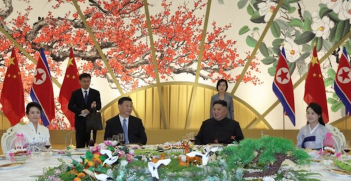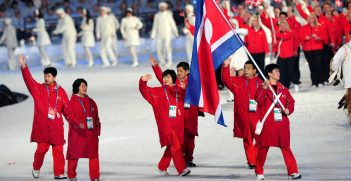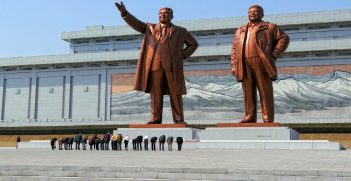The North Korea Problem: A New Approach

The high-stakes game of name-calling between the current US administration and the Kim regime has brought back Cold War-era fears of nuclear armageddon. Is it time for a new approach?
Almost every day, a new story emerges in the ongoing North Korean crisis. More missile tests, more sanctions, more insults traded over Twitter.
By some interpretations, the Korean War has been going on for 67 years. While a ceasefire has been in effect since 1953, the border at the 38th Parallel is still patrolled by soldiers, ringed with barbed wire and covered in landmines. The Cold War mentality that originally created the North–South split still lingers in the thinking of participants on both sides, creating a stagnant geopolitical impasse that shows no sign of reaching a peaceful resolution anytime soon.
After almost seven decades of containing, isolating and embargoing North Korea has failed to deliver a positive outcome, surely it’s time to rethink the strategy. Instead of treating North Korea as a monster that threatens to engulf the world, perhaps it would be best to try and engage with the country, bring it into the international community and slowly open it up to change.
The prevailing attitude to North Korea is sanctions, sanctions, sanctions. This is one of the most isolated, economically depressed countries in the world and yet it shows no signs of ending its nuclear weapons program. With the test launch of the Hwasong-15 showing that the DPRK now has the capacity to strike anywhere in the continental United States, it’s time to bury the myth that the rest of the world can sanction a country into submission.
Sanctions are an easy and popular way to show disaffection but don’t have much record of success. Like the idea that the Germans or the Vietnamese could be bombed into surrender, sanctions often strengthen the resolve of a country to endure and continue fighting. Cuba has withstood economic sanctions for decades and the Communist Party remains in power; Russia is still a global player, able to influence votes in the UK and the US despite heavy state sanctions; and North Korea has still managed to develop a mature and sophisticated missile and nuclear program despite 12 separate UN security council resolutions sanctioning the country.
Instead of repeatedly sanctioning North Korea, it’s necessary to look at what diplomatic measures have actually succeeded in defusing tensions and triggering reforms in other countries.
For much of the Cold War, the relationship between China and the US was quite similar to that between North Korea and America today. As with North Korea, China was a nuclear-armed communist state trying to assert dominance over a capitalist, US-backed alternative government, complete with a breakdown in the diplomatic relationship that made it seemingly impossible to resolve tensions.
Yet despite this, Nixon was able to institute a rapprochement that normalised relations between the two countries, and was the first president to ever visit Beijing. Since then, every subsequent US president barring Jimmy Carter has made a trip to China, and the economic relationship between the two countries is one of the most important in the world.
This improvement in relations was not the result of sanctioning China into submission, treating it like a naughty child and withholding its dessert until it finished its vegetables. Instead, it was the result of treating China as a peer, as worthy of respect.
The same thing happened with Cuba under the Obama administration when the then-president was the first US leader to visit the island since 1928. As a result, embassies were reopened, travel restrictions were loosened and US banks had access to the Cuban financial system. The same thing also happened when Gorbachev implemented his policy of glasnost, or openness, allowing an influx of Western goods and ideas into the USSR, resulting in its dissolution shortly after.
By engaging with North Korea on an equal footing, by listening and attempting to mollify its concerns and, by restoring trade links, it may be possible to bring about a resolution to the ongoing tensions. It’s necessary to provide North Korea with assurances that it won’t be suddenly reduced to rubble because the president woke up on the wrong side of the bed. In return, it’s important to seek a liberalisation of trade and the movement of people. It’s necessary to give North Korea a stake in maintaining peaceful relationships with its neighbours, and this can be done by increasing its trade and cultural links to the region. While neither the repressive measures the North Korean government employs nor its flagrant breaches of human rights can be condoned, by increasing wealth and access to information in North Korea, it can slowly but surely be influenced to become a participant in the international order, giving it a reason to back off its own aggressive posturing.
North Korea is pursuing nuclear weapons for perfectly rational reasons. Isolated and hemmed in by the most powerful military on the planet, nuclear weapons give North Korea a significant tool to ensure its survival into the foreseeable future. Just as the nuclear standoff between Russia and the US prevented outright war between the two during the Cold War, North Korea is betting that possessing nukes of its own will force America to think twice before invading.
From this perspective, is it any wonder that Kim Jong-Un continues to test missile platforms despite, or indeed because of, the increasingly belligerent outbursts from Donald Trump. North Korea wants to survive, and repeated sanctions only serve to stiffen its resolution. Trump may claim that negotiations always fail, but they worked to open up China, they worked to open up Cuba, they worked to bring about the end of the USSR and they can work to peacefully resolve tensions with North Korea.
Tim Smith is a former intern with AIIA National Office.
This article is published under a Creative Commons Licence and may be republished with attribution.





